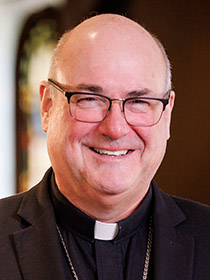
Faith
If, in sinning, we make the choice to turn away from God, it may be tempting to imagine that repentance involves a personal choice to return to the right path.

Henning
The ashes distributed on Ash Wednesday have a power within the Christian imagination. It is curious that even people who do not typically attend Mass will show up at church for ashes. Every once in a while, a "wag" will observe that we should distribute ashes every Sunday in the hopes of attracting the crowds on a more regular basis!
As we begin our Lenten observance, it is good to recall the nature of conversion as revealed to us in the Holy Scriptures. One of the key metaphors for a life of faith in the Bible is that of "walking" in the way of the Lord. The early Christian Church referred to itself as "the way," denoting a path or road. The term looked back to that biblical language and to the experience of Jesus' ministry, which largely occurred "on the road" as He travelled Galilee and Judea with His disciples. The early Church understood that by the power of the Spirit, the Lord Jesus continued to accompany His people on the journey of life. By the same metaphor, sin involved a straying from that path and away from the Lord. Repentance and conversion was, therefore, a matter of returning to the path -- a change in direction, perspective, and way of life.
If, in sinning, we make the choice to turn away from God, it may be tempting to imagine that repentance involves a personal choice to return to the right path. The Gospel teaches otherwise. While sin may begin with a choice (and a false one at that), repentance and conversion are founded on the initiative of the Lord. If repentance is a personal choice, then it is little more than another version of self-help and likely to last about as long as New Year's resolutions.
The Gospels show us that lasting repentance comes when the Lord calls to us. It begins with an awareness of the overwhelming and generous grace of God and the contrast between that greatness and our pettiness. When the Spirit convicts us and turns us back, conversion does not rely upon our variable capacity but upon the fidelity and goodness of God.
I remind us of this distinction in order to suggest that our Lenten observance begins not with our own initiative or even a personal examination of conscience but in meditation upon and gratitude for all that God has done and promised. Consider your own experience as a child. When people give us a list of rules, we might keep them out of fear of consequences. Such rules rarely change hearts. When our motivation is linked to our love and trust of another, however, our capacity to act comes from a different place and has the strength to endure.
On Ash Wednesday, the crowds will come to church to hear those strange words: ''Remember you are dust and unto dust you will return." These would be terrifying words if not for the amazing truth that the very same Loving Creator Who breathed us to life from the dust of the cosmos has given His Beloved Son to bring us to life forevermore. Even if some of the folks who come for ashes do not understand the depth of this truth, something in them is drawn to the Lord and His grace and mercy. May each and every one of us know His presence, His love, and His redeeming grace. May we turnabout and walk with Him along the way of salvation!
- Archbishop Richard G. Henning is the Archbishop of Boston
Recent articles in the Faith & Family section
-
FathersJaymie Stuart Wolfe
-
The Prayer of Mary and the saints who met herFather Robert M. O'Grady
-
The wayArchbishop Richard G. Henning
-
The Saints of Black History MonthMaureen Crowley Heil
-
Heart and mouthScott Hahn























